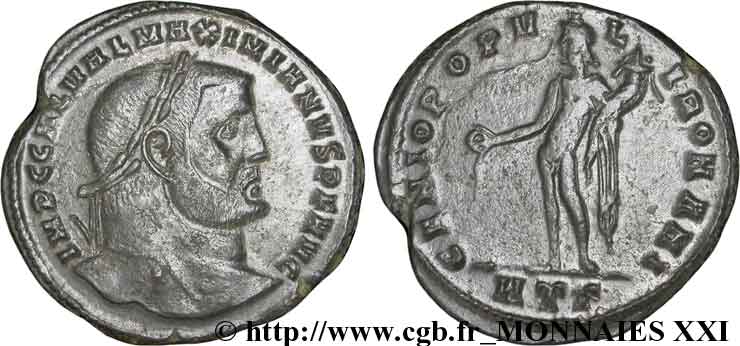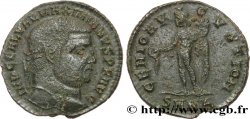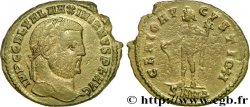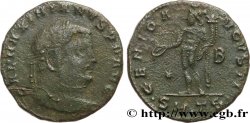v21_3483 - GALERIUS Follis ou nummus
MONNAIES 21 (2004)
Starting price : 100.00 €
Estimate : 200.00 €
unsold lot
Starting price : 100.00 €
Estimate : 200.00 €
unsold lot
Type : Follis ou nummus
Date: 305-306
Mint name / Town : Europe, Héraclée (Heraclea)
Metal : copper
Millesimal fineness : 30 ‰
Diameter : 28 mm
Orientation dies : 6 h.
Weight : 10,39 g.
Officine: 3e
Emission: 3e
Coments on the condition:
Portrait magnifique sur un flan large et complet. Flan irrégulier. Jolie patine vert olive foncé. Flan légèrement échancré à 10 heures
Obverse
Obverse legend : IMP C GAL VAL MAXIMIANVS P F AVG.
Obverse description : Tête laurée de Galère césar à droite (O*).
Obverse translation : “Imperator Cæsar Galerius Valerius Maximianus Pius Felix Augustus”, (L’empereur césar Galère Valère Maximien pieux heureux auguste).
Reverse
Reverse legend : GENIO POPV-L-I ROMANI//.
Reverse description : Genius (le Génie) debout de face, coiffé du modius, le manteau sur l'épaule gauche, tenant une patère de la main droite et une corne d'abondance de la main gauche.
Reverse legend : HTG.
Reverse translation : “Genio Populi Romani”, (Au Génie du Peuple romain).
Commentary
Poids léger. Trace de frappe incuse au revers.








 Report a mistake
Report a mistake Print the page
Print the page Share my selection
Share my selection Ask a question
Ask a question Consign / sell
Consign / sell
 Full data
Full data



